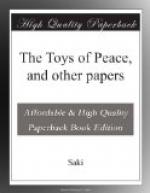Bertie Steffink, nephew of the aforementioned Luke, had early in life adopted the profession of ne’er-do-weel; his father had been something of the kind before him. At the age of eighteen Bertie had commenced that round of visits to our Colonial possessions, so seemly and desirable in the case of a Prince of the Blood, so suggestive of insincerity in a young man of the middle-class. He had gone to grow tea in Ceylon and fruit in British Columbia, and to help sheep to grow wool in Australia. At the age of twenty he had just returned from some similar errand in Canada, from which it may be gathered that the trial he gave to these various experiments was of the summary drum-head nature. Luke Steffink, who fulfilled the troubled role of guardian and deputy-parent to Bertie, deplored the persistent manifestation of the homing instinct on his nephew’s part, and his solemn thanks earlier in the day for the blessing of reporting a united family had no reference to Bertie’s return.
Arrangements had been promptly made for packing the youth off to a distant corner of Rhodesia, whence return would be a difficult matter; the journey to this uninviting destination was imminent, in fact a more careful and willing traveller would have already begun to think about his packing. Hence Bertie was in no mood to share in the festive spirit which displayed itself around him, and resentment smouldered within him at the eager, self-absorbed discussion of social plans for the coming months which he heard on all sides. Beyond depressing his uncle and the family circle generally by singing “Say au revoir, and not good-bye,” he had taken no part in the evening’s conviviality.
Eleven o’clock had struck some half-hour ago, and the elder Steffinks began to throw out suggestions leading up to that process which they called retiring for the night.
“Come, Teddie, it’s time you were in your little bed, you know,” said Luke Steffink to his thirteen-year-old son.
“That’s where we all ought to be,” said Mrs. Steffink.
“There wouldn’t be room,” said Bertie.
The remark was considered to border on the scandalous; everybody ate raisins and almonds with the nervous industry of sheep feeding during threatening weather.
“In Russia,” said Horace Bordenby, who was staying in the house as a Christmas guest, “I’ve read that the peasants believe that if you go into a cow-house or stable at midnight on Christmas Eve you will hear the animals talk. They’re supposed to have the gift of speech at that one moment of the year.”
“Oh, do let’s all go down to the cow-house and listen to what they’ve got to say!” exclaimed Beryl, to whom anything was thrilling and amusing if you did it in a troop.




